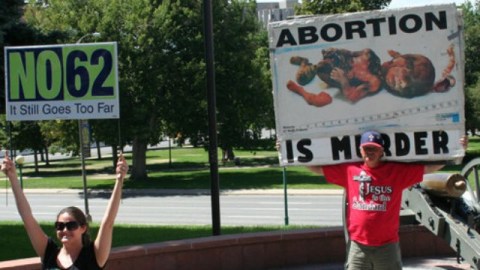Colorado’s Personhood Amendment Was Defeated, But Was Amendment 62 Part of a Longer Term Strategy to Normalize Extreme Anti-Abortion Views?

In the final guest post on Colorado’s defeated Amendment 62, a “personhood” initiative that would have given full legal rights to fertilized human eggs, Trina Stout examines the effect of such extreme views on national politics.–Matthew Nisbet
Amendment 62 failed 73-21% Tuesday night, but its longer term impact remains unclear.
Proponents of the personhood initiative acknowledged all along that they weren’t going to win, but likened Amendment 62 — and the nearly identical 2008 measure — to a battle in a larger war against abortion rights in general. Political blogger Amanda Marcotte argues that these sorts of repeated attacks normalize the idea that reproductive rights ought to be diminished:
The whole point of doing things like putting personhood amendments on the ballot in places like Colorado is not to win immediately. It’s to quietly mainstream more extreme views on reproductive rights, to normalize the idea of banning IVF, contraception, and even some kinds of medical care for women of reproductive age, pregnant or not.
Are extreme anti-abortion rights views becoming mainstream? Not according to Gallup polls, which show that American attitudes toward abortion have stayed fairly constant over the past few decades; 24% think abortion should be legal under any circumstances, 54% think it should be legal only under certain circumstances, and 19% think it should be illegal in all circumstances.
Are Candidates Becoming More Extreme on Abortion Rights?
Public opinion may not have changed, but are candidates now more than ever expressing extreme anti-abortion rights views? It seems so. This election, Republican Senate candidates Sharron Angle (NV), Ken Buck (CO), Joe Miller (AK), Christine O’Donnell (DE), Rand Paul (KY), and gubernatorial candidate Carl Paladino (NY) openly stated that they oppose a woman’s right to choose abortion, even in cases of rape and incest.
These candidates’ extreme positions inspired their Democratic opponents to do “what they said could never be done” — campaign for abortion rights. At the link, Rachel Maddow highlights political ads that defy what she calls the common wisdom that Democrats can’t campaign on abortion rights.
What Do the 2010 Elections Mean for the Future?
Colorado’s Amendment 62 failed, but personhood proponents are already planning to try again.
Sharron Angle, Christine O’Donnell and Carl Paladino lost. Rand Paul won, and the Joe Miller and Ken Buck races have gone to a ballot re-count. The fact that these candidates felt comfortable publically opposing abortion with no exceptions is telling, but so is the fact that at least half of them lost.
Can we expect 2012 candidates to use extreme anti-abortion rights positions as a strategy? My guess is yes. Such stances have become a way for Republicans to differentiate themselves during the primaries, when they are competing against other Republicans for money and votes.
2010 proved that extreme views win primaries, but will they win general elections? We’ll have to wait and see.
NOTE: In 2008, Republican Presidential primary candidate Mike Huckabee, and Vice Presidential candidate Sarah Palin expressed support for a ban on abortion with no exceptions for rape or incest. In 2006, South Dakota Governor Mike Rounds signed such a bill into law (it was overturned by the voters). A quick Googling of previous elections did not turn up any major candidates that held such views, but I would be curious to see more exhaustive research. Insight from readers is welcome.
–Guest post by Trina Stout, a graduate student at American University’s School of Communication, focusing on a career in reproductive health advocacy. Before graduate school, she worked for the environmental news and humor site Grist.
See Also:
No on Amendment 62 Campaign Appeals to Voters Seeking Fertility Treatments
Amendment 62: “It Still Goes Too Far” vs. “Persons, not Property”
Amendment 62: Colorado to Vote on Whether Fertilized Eggs Are People (Again)
Follow Age of Engagementon Twitter.





